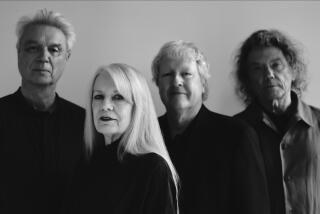REUNITED BRAINS SLOWS DOWN A BIT
- Share via
The Brains are back.
That’s the word in punk circles, whose often insular musical and cultural perceptions were radically altered in the late ‘70s by the arrival of Bad Brains.
The Washington, D.C. quartet--whose astoundingly aggressive shows were often keyed by kinetic singer H.R.’s swan dives into the crowd--was the only major black presence on a virtually all-white scene, and its unlikely mix of blinding speed-rock and lilting reggae brought a new dimension to the raging punk sound.
But that seemingly contradictory combination also led to the Bad Brains’ breakup, which came in 1983 after the band released its Ric Ocasek-produced album, “Rock for Light.” Now, reconciled and reunited, the foursome is scheduled to play the Santa Monica Civic tonight with England’s ADX.
“We didn’t really analyze it,” bassist Darryl Jenifer says of the band’s punk-reggae juxtaposition. “We just said, ‘Oh, we dig reggae, let’s play a little bit of that. . . . Oh, we dig this stuff too, let’s play that.’ It’s not like we were going, ‘What are people going to think?’
“To me, it’s both rebel music. It’s like the dreads--the people that dig reggae--have a rebel sense in ‘em, and the kids that dig the hard core and the speed-rock, they got a little rebel sense, too. To me, it’s the same music, it’s just two different extremes.”
It was singer H.R.’s increasing absorption in reggae, according to Jenifer, that broke up the Brains. “He wanted to play his own ‘Zion Train’ and have his own thing,” Jenifer said this week during a phone interview from his home in Woodstock, N.Y. “Everybody’s head went in different directions, then everybody’s head kind of pulled back to where it was.”
The reunion came when the group got back together for a couple of shows in New York. Said Jenifer, “It was cool. It felt good. It was the first time either one of us had played in a group where we got a good reception since we broke up.”
The reborn Brains, according to Jenifer, have a few changes in store: There’s a little less reggae, and a little less speed.
“It’s got the same edge as the (old) Brains--we can’t get rid of that,” the bassist said of the group’s new sound. “It’s just not as fast. It’ll fit right in the kids’ pocket, ‘cause before we were a little bit too fast. I don’t want to slow it all the way down where you can say, ‘Check these dudes out, they’re playing wimpy.’ I want to keep the edge. The edge in Bad Brains isn’t the speed of the music. If we slow it down just a little bit, just below the high-velocity level, more people will be able to listen to it.”
That interest in a wider audience signals another change for Bad Brains, who in the past have jealously guarded their independent stance and been highly suspicious of any commercial concessions. “I want to take the best route, where the most people can hear what I have to do,” said Jenifer. “Yeah, I’d sign with a major label if it could help us get our point across and not rip us off.”
The Brains’ management is shopping the band’s music to record companies, they’ve shot a couple of performance videos and one of their songs is featured in Martin Scorsese’s new film “After Hours.” But don’t interpret the Brains’ expansionist moves as compromising the basic message--which, like the music, combines punk’s aggression with reggae’s cosmic spirituality.
“H.R. writes most of the lyrics, and he’s headstrong in being positive,” Jenifer noted. “We just want peace. It’s no negative trip. We’re just saying, ‘Buckle up and get yourself together and see that there’s some love.’ ”
More to Read
The biggest entertainment stories
Get our big stories about Hollywood, film, television, music, arts, culture and more right in your inbox as soon as they publish.
You may occasionally receive promotional content from the Los Angeles Times.










